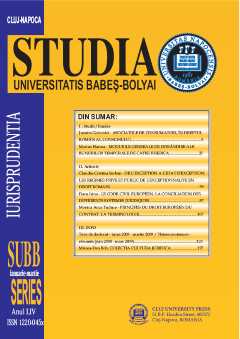PRINCIPIUL EGALITĂŢII ARMELOR ŞI AL CONTRADICTORIALITĂŢII ÎN LUMINA JURISPRUDENŢEI C.E.D.O. ...
THE PRINCIPLE OF EQUALITY OF ARMS AND THE PRINCIPLE OF ADVERSARIAL PROCESS IN THE JURISPRUDENCE OF THE E.C.H.R ...
Author(s): Hunor KádárSubject(s): Law, Constitution, Jurisprudence
Published by: Studia Universitatis Babes-Bolyai
Keywords: European Court of Human Rights; the principle of equality of arms; the principle of adversarial process; European Convention on Human Rights; witness cross-examination.
Summary/Abstract: The principle of equality of arms and the principle of adversarial process in the jurisprudence of the e.c.h.r. the effects of these principles on the cross-examination of witnesses In the present study the author makes a concise presentation of the principle of equality of arms based on the motivation of the European Comission of Human Rights in the cases Pataki and Dunshirn v. Austria and Ofner and Hopfinger v. Austria, opinions which were reiterated by the European Court of Human Rights too in the cases Delcourt v. Belgium and Bogers v. Belgium. In the jurisprudence of the Srasbourg Court the principle of equality of arms is regarded as a fundamental one which finds application in both civil and penal cases, being at the same time an essential component of the notion of right to a fair trial. Furthermore the dispositions found in the art. 6 parag. 3 letter d) of the European Convention of Human Rights does not represent anything less than the punctual expression of the larger concept of equality of arms, altough this concept does not have the call of guaranting a mathematical equality between the parties. As a result the right set in the art. 6 parag. 3 lit. d) of the European Convention on Human Rights is not an absolute right. In relation to the principle of adversarial process, in the case of Barberá, Messegué and Jabardo v. Spain the European Court of Human Rights had emphasized that every element of proof, the ones with testimonial nature also, must be presented in the accused’s presence, in a public session, within an adversarial debate. On the contrary in the case of Unterpertinger v. Austria the supernational court stated that the rights set in the art. 6 parag. 3 letter d) of the European Convention on Human Rights is not entrenched upon, if the accused had an adequate opportunity to exercise it in a certain phase of the penal process, which was reiterated in the case of Kostovski v. Netherlands. As a result the Strasbourg Court had emphasized again that the rights set in the art. 6 parag. 3 letter d) of the European Convention on Human Rights are not absolute and their exercise could be limited for different reasons: fight against organized crime, the interests of the witnesses, members of the accused’s family or the protection of the victims of certain crimes with sexual nature.
Journal: Studia Universitatis Babes Bolyai - Iurisprudentia
- Issue Year: 56/2011
- Issue No: 4
- Page Range: 161-175
- Page Count: 15
- Language: Romanian

